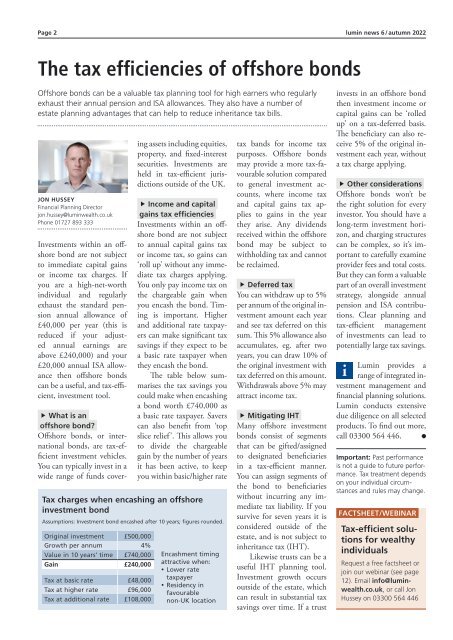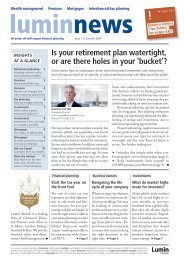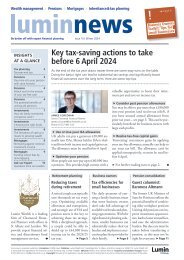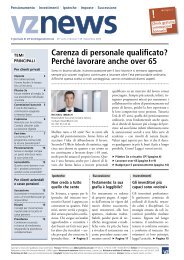lumin news Issue 6 / Autumn 2022
You also want an ePaper? Increase the reach of your titles
YUMPU automatically turns print PDFs into web optimized ePapers that Google loves.
Page 2 <strong>lumin</strong> <strong>news</strong> 6 / autumn <strong>2022</strong><br />
The tax efficiencies of offshore bonds<br />
Offshore bonds can be a valuable tax planning tool for high earners who regularly<br />
exhaust their annual pension and ISA allowances. They also have a number of<br />
estate planning advantages that can help to reduce inheritance tax bills.<br />
JON HUSSEY<br />
Financial Planning Director<br />
jon.hussey@<strong>lumin</strong>wealth.co.uk<br />
Phone 01727 893 333<br />
Investments within an offshore<br />
bond are not subject<br />
to immediate capital gains<br />
or income tax charges. If<br />
you are a high-net-worth<br />
individual and regularly<br />
exhaust the standard pension<br />
annual allowance of<br />
£40,000 per year (this is<br />
reduced if your adjusted<br />
annual earnings are<br />
above £240,000) and your<br />
£20,000 annual ISA allowance<br />
then offshore bonds<br />
can be a useful, and tax-efficient,<br />
investment tool.<br />
What is an<br />
offshore bond?<br />
Offshore bonds, or international<br />
bonds, are tax-efficient<br />
investment vehicles.<br />
You can typically invest in a<br />
wide range of funds covering<br />
assets including equities,<br />
property, and fixed-interest<br />
securities. Investments are<br />
held in tax-efficient jurisdictions<br />
outside of the UK.<br />
Income and capital<br />
gains tax efficiencies<br />
Investments within an offshore<br />
bond are not subject<br />
to annual capital gains tax<br />
or income tax, so gains can<br />
‘roll up’ without any immediate<br />
tax charges applying.<br />
You only pay income tax on<br />
the chargeable gain when<br />
you encash the bond. Timing<br />
is important. Higher<br />
and additional rate taxpayers<br />
can make significant tax<br />
savings if they expect to be<br />
a basic rate taxpayer when<br />
they encash the bond.<br />
The table below summarises<br />
the tax savings you<br />
could make when encashing<br />
a bond worth £740,000 as<br />
a basic rate taxpayer. Savers<br />
can also benefit from ‘top<br />
slice relief’. This allows you<br />
to divide the chargeable<br />
gain by the number of years<br />
it has been active, to keep<br />
you within basic/higher rate<br />
Tax charges when encashing an offshore<br />
investment bond<br />
Assumptions: Investment bond encashed after 10 years; figures rounded.<br />
Original investment £500,000<br />
Growth per annum 4%<br />
Value in 10 years’ time £740,000<br />
Gain £240,000<br />
Tax at basic rate £48,000<br />
Tax at higher rate £96,000<br />
Tax at additional rate £108,000<br />
Encashment timing<br />
attractive when:<br />
• Lower rate<br />
taxpayer<br />
• Residency in<br />
favourable<br />
non-UK location<br />
tax bands for income tax<br />
purposes. Offshore bonds<br />
may provide a more tax-favourable<br />
solution compared<br />
to general investment accounts,<br />
where income tax<br />
and capital gains tax applies<br />
to gains in the year<br />
they arise. Any dividends<br />
received within the offshore<br />
bond may be subject to<br />
withholding tax and cannot<br />
be reclaimed.<br />
Deferred tax<br />
You can withdraw up to 5%<br />
per annum of the original investment<br />
amount each year<br />
and see tax deferred on this<br />
sum. This 5% allowance also<br />
accumulates, eg. after two<br />
years, you can draw 10% of<br />
the original investment with<br />
tax deferred on this amount.<br />
Withdrawals above 5% may<br />
attract income tax.<br />
Mitigating IHT<br />
Many offshore investment<br />
bonds consist of segments<br />
that can be gifted/assigned<br />
to designated beneficiaries<br />
in a tax-efficient manner.<br />
You can assign segments of<br />
the bond to beneficiaries<br />
without incurring any immediate<br />
tax liability. If you<br />
survive for seven years it is<br />
considered outside of the<br />
estate, and is not subject to<br />
inheritance tax (IHT).<br />
Likewise trusts can be a<br />
useful IHT planning tool.<br />
Investment growth occurs<br />
outside of the estate, which<br />
can result in substantial tax<br />
savings over time. If a trust<br />
invests in an offshore bond<br />
then investment income or<br />
capital gains can be ‘rolled<br />
up’ on a tax-deferred basis.<br />
The beneficiary can also receive<br />
5% of the original investment<br />
each year, without<br />
a tax charge applying.<br />
Other considerations<br />
Offshore bonds won’t be<br />
the right solution for every<br />
investor. You should have a<br />
long-term investment horizon,<br />
and charging structures<br />
can be complex, so it’s important<br />
to carefully examine<br />
provider fees and total costs.<br />
But they can form a valuable<br />
part of an overall investment<br />
strategy, alongside annual<br />
pension and ISA contributions.<br />
Clear planning and<br />
tax-efficient management<br />
of investments can lead to<br />
potentially large tax savings.<br />
Lumin provides a<br />
range of integrated investment<br />
management and<br />
financial planning solutions.<br />
Lumin conducts extensive<br />
due diligence on all selected<br />
products. To find out more,<br />
call 03300 564 446.<br />
Important: Past performance<br />
is not a guide to future performance.<br />
Tax treatment depends<br />
on your individual circumstances<br />
and rules may change.<br />
FACTSHEET/WEBINAR<br />
Tax-efficient solutions<br />
for wealthy<br />
individuals<br />
Request a free factsheet or<br />
join our webinar (see page<br />
12). Email info@<strong>lumin</strong>wealth.co.uk,<br />
or call Jon<br />
Hussey on 03300 564 446

















